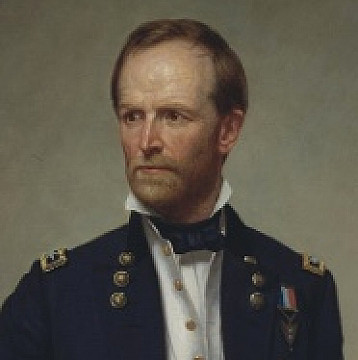Gen. William Tecumseh Sherman (1820-1891)
General William T. Sherman, Commander-in-Chief of the U.S. Army
He was born at Lancaster, Ohio, and was given his middle name on account of his father's admiration for the Chief of the Shawnees, Tecumseh, who was killed at the Battle of Thame in 1813. In 1836, William joined the U.S. Army as a 16-year old officer cadet at West Point Academy. In 1861, he commanded a volunteer brigade at the First Battle of Bull Run before being transferred to the Western Theater. While stationed at Kentucky, his pessimism about the war led to a breakdown and he was placed on leave.
On his recovery, Sherman forged a close alliance with General Ulysses S. Grant and fought under him at the Battles of Fort Henry, Fort Donelson and Shiloh, leading to the fall of the Confederate stronghold at Vicksburg that culminated in the routing of the Confederate armies in Tennessee. In 1864, Sherman succeeded Grant as Commander of the Western Theater and by taking Atlanta directly contributed to Abraham Lincoln's re-election. Sherman's subsequent famous "March to the Sea" through Georgia and the Carolinas involved little fighting but large-scale destruction of military and civilian infrastructure, intended to undermine the Confederacy's ability and willingness to continue fighting.
General Sherman accepted the surrender of all the Confederate armies in the Carolinas, Georgia, and Florida in 1865, but the terms that he negotiated were considered too generous by U.S. Secretary of War Edwin Stanton and Grant was ordered to modify them. When Grant became President of the United States in 1869, Sherman succeeded him as Commanding General of the U.S. Army, serving in that capacity until 1883 during which time he was responsible for the U.S. Army's engagement in the Indian Wars. He steadfastly refused to be drawn into party politics and in 1875 published his memoirs, which became one of the best-known first-hand accounts of the Civil War. The British military historian, B. H. Liddell Hart, declared that Sherman was, "the most original genius of the American Civil War" and, "the first modern general". In 1850, he married his foster sister, Ellen, daughter of Senator Thomas Ewing, then the U.S. Secretary of the Interior. They had eight children, six of whom (listed) survived to adulthood.
On his recovery, Sherman forged a close alliance with General Ulysses S. Grant and fought under him at the Battles of Fort Henry, Fort Donelson and Shiloh, leading to the fall of the Confederate stronghold at Vicksburg that culminated in the routing of the Confederate armies in Tennessee. In 1864, Sherman succeeded Grant as Commander of the Western Theater and by taking Atlanta directly contributed to Abraham Lincoln's re-election. Sherman's subsequent famous "March to the Sea" through Georgia and the Carolinas involved little fighting but large-scale destruction of military and civilian infrastructure, intended to undermine the Confederacy's ability and willingness to continue fighting.
General Sherman accepted the surrender of all the Confederate armies in the Carolinas, Georgia, and Florida in 1865, but the terms that he negotiated were considered too generous by U.S. Secretary of War Edwin Stanton and Grant was ordered to modify them. When Grant became President of the United States in 1869, Sherman succeeded him as Commanding General of the U.S. Army, serving in that capacity until 1883 during which time he was responsible for the U.S. Army's engagement in the Indian Wars. He steadfastly refused to be drawn into party politics and in 1875 published his memoirs, which became one of the best-known first-hand accounts of the Civil War. The British military historian, B. H. Liddell Hart, declared that Sherman was, "the most original genius of the American Civil War" and, "the first modern general". In 1850, he married his foster sister, Ellen, daughter of Senator Thomas Ewing, then the U.S. Secretary of the Interior. They had eight children, six of whom (listed) survived to adulthood.







